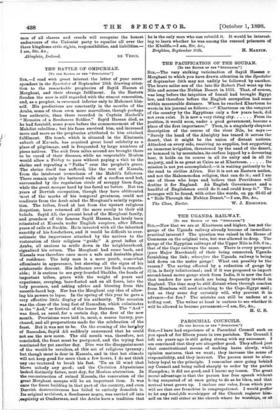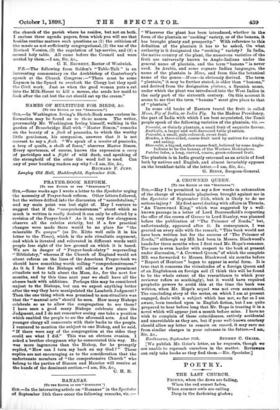PAROCHIAL COUNCILS.
[To THE EDITOR OP THE " SPECTATOE:1 Sra,—I have had experience of a Parochial Council such ae. you speak of for fifteen years in two parishes. The Council I. left six years ago is still going strong with my successor. I am convinced that they are altogether good. They afford just that constitutional means of making haste slowly, while opinion matures, that we want; they increase the sense of responsibility, and they instruct. The parson must be abso- lutely loyal to the principle. I remember once going behind my Council and being called sharply to order by the parish Hampden; it did me good, and I learnt my lesson. The great moral advantage is that the parson has free speech without bring suspected of at once going to do as he likes, and that mutual trust grows up. I enclose our rules, from whioh you will see that our franchise is congregational. I would prefer to let any bona'-fule worshipper of the Church register him- self on the roll either at the church where he worships, or at The .dhurcla of the parish where he resides, but not on both. I enclose three agenda papers, from which you will see that 'besides routine matters such questions as (1) the criticism of the music as not sufficiently congregational, (2) the use of the Revised Version, (3) the regulation of lay-service, and (4) a seeoad holy table. All came before the Council and were settled by them.—I am, Sir, &c., C. E. ESCREET, Rector of Woolwich.
P.S.—The following from Selden's " Table-Talk " is an interesting commentary on the Archbishop of Canterbury's speech at the Church Congress :—" There must be some Laymen in the Synod to overlook the Clergy lest they spoil -the Civil work. Just as when the good woman puts a cat into the Milk-House to kill a mouse, she sends her maid to /look after the cat lest the cat should eat up the cream."







































 Previous page
Previous page